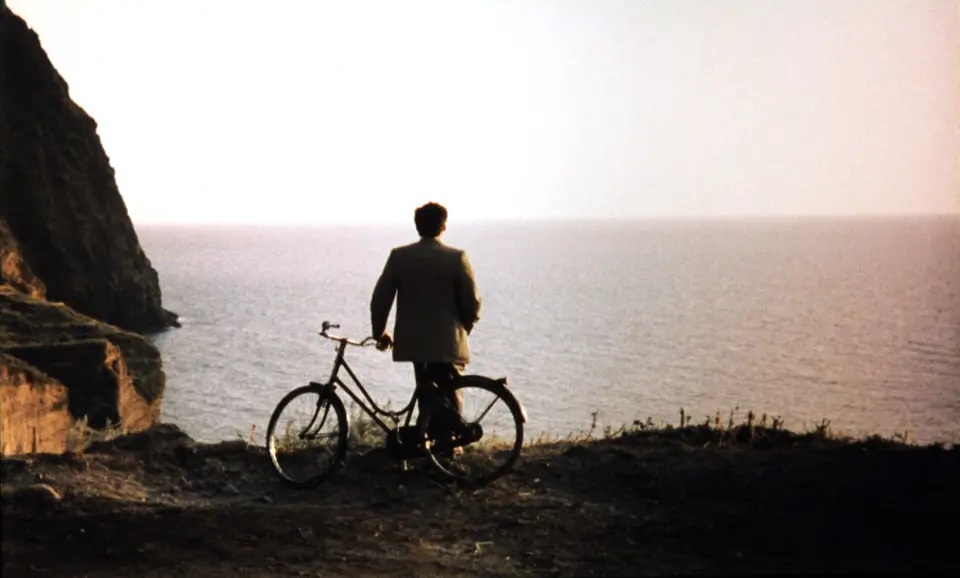

“I didn’t say anything to her. I looked at her and fell in love”
Mario is a young unemployed man living in a small village of fishermen, but doesn’t love fishing: we’re in Marina Corricella on Procida, an island in the Campanian Archipelago bordering on the Gulf of Naples. This is where the locations for the inn where Beatrice works (the interiors were reconstructed at Cinecittà), the post office and the Church of the Madonna delle Grazie, where the procession of the Madonna that ends in the sea begins, can be found. Also on Procida is the cinema where Mario watches the documentary heralding the arrival of Pablo Neruda on the island.
Town life essentially revolves around the port, where fishermen arrive with full boats and sell the fish they’ve caught. On Pozzo Vecchio Beach, on the western side of the island, also known as ‘The Postman Beach’, Maria looks for Beatrice and makes her fall in love with him by talking about poetry and citing metaphors. The beach is a stretch of sand in the shape of a horseshoe, and its dark volcanic sand gives the sea an intense dark blue hue.
Mario lives with his elderly fisherman father in a house overlooking Pollara Beach, also known as ‘The Postman Beach’, but this is actually located on Salina, one of the Aeolian Islands in the municipality of Malfa. It is on this beach of stones and gravel, located on the north-western point of the island, facing the island of Filicudi and protected by steep walls of rock, that the friendship between the postman and the poet is forged to the sound of verses and metaphors.
In the district of Pollara, Mario cycles down a sun-drenched road flanking the sea and heads into the mountains, leading to the red house where Pablo Naruda lives, with its veranda overlooking the Aeolian archipelago.
To film some of the opening scenes of Mario on his bicycle, the production team chose the island of Pantelleria, the uncontaminated landscape of which lent itself to a story set in the 1950s.
“I didn’t say anything to her. I looked at her and fell in love”
Mario is a young unemployed man living in a small village of fishermen, but doesn’t love fishing: we’re in Marina Corricella on Procida, an island in the Campanian Archipelago bordering on the Gulf of Naples. This is where the locations for the inn where Beatrice works (the interiors were reconstructed at Cinecittà), the post office and the Church of the Madonna delle Grazie, where the procession of the Madonna that ends in the sea begins, can be found. Also on Procida is the cinema where Mario watches the documentary heralding the arrival of Pablo Neruda on the island.
Town life essentially revolves around the port, where fishermen arrive with full boats and sell the fish they’ve caught. On Pozzo Vecchio Beach, on the western side of the island, also known as ‘The Postman Beach’, Maria looks for Beatrice and makes her fall in love with him by talking about poetry and citing metaphors. The beach is a stretch of sand in the shape of a horseshoe, and its dark volcanic sand gives the sea an intense dark blue hue.
Mario lives with his elderly fisherman father in a house overlooking Pollara Beach, also known as ‘The Postman Beach’, but this is actually located on Salina, one of the Aeolian Islands in the municipality of Malfa. It is on this beach of stones and gravel, located on the north-western point of the island, facing the island of Filicudi and protected by steep walls of rock, that the friendship between the postman and the poet is forged to the sound of verses and metaphors.
In the district of Pollara, Mario cycles down a sun-drenched road flanking the sea and heads into the mountains, leading to the red house where Pablo Naruda lives, with its veranda overlooking the Aeolian archipelago.
To film some of the opening scenes of Mario on his bicycle, the production team chose the island of Pantelleria, the uncontaminated landscape of which lent itself to a story set in the 1950s.

Esterno Mediterraneo Film, Cecchi Gori Group, Tiger Cinematografica
Loosely based on the novel The Postman by Antonio Skarmeta. On the island that gave political asylum to Chilean poet Pablo Neruda, which is inhabited by illiterate fishermen, Mario is hired as the local postman, just to deliver the former his correspondence. He is so enraptured by the poet’s work that he gradually becomes more and more caught up in the world of poetry.